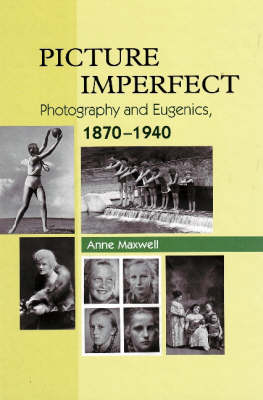
Stock image for illustration purposes only - book cover, edition or condition may vary.
Picture Imperfect: Photography and Eugenics, 1879-1940
Anne Maxwell
€ 161.14
FREE Delivery in Ireland
Description for Picture Imperfect: Photography and Eugenics, 1879-1940
Hardback. Analyses the photographs that helped strengthen as well as bring down the Eugenics Movement. Concentrating mainly on developments in Britain, the USA and Nazi Germany, this book argues that photography, as the most powerful visual medium of the late nineteenth and early twentieth centuries, was vital to the Eugenics Movement's success. Num Pages: 286 pages, 120 b/w photos. BIC Classification: 1DBK; 1DFG; 1KBB; AJ; HBTB; PSAK. Category: (G) General (US: Trade). Dimension: 252 x 175 x 22. Weight in Grams: 712.
Documents and critically analyses the photographs that helped strengthen as well as bring down the Eugenics Movement. Using a large body of racial-type images and a variety of historical and archival sources, and concentrating mainly on developments in Britain, the USA and Nazi Germany, the author argues that photography, as the most powerful visual medium of the late nineteenth and early twentieth centuries, was vital to the Eugenics Movements success -- not only did it allow eugenicists to identify the people with superior and inferior hereditary traits, but it helped publicise and lend scientific authority to eugenicists racial theories. The author further argues for a strong connection between the racial-type photographs that eugenicists created and the photographic images produced by nineteenth-century anthropologists and prison authorities, and that the photographic works of contemporary liberal anthropologists played a significant role in the Eugenics Movements downfall. Besides adding to our knowledge of photography's crucial role in helping to authorise and implement some of the most controversial social policies of modern times, this book makes a major contribution to our understanding of the history of racism. Most accounts of eugenics have been written by history of science scholars, with an emphasis on the history of science and medicine. In contrast, Picture Imperfect looks at eugenics from the standpoint of its most significant cultural data -- racial-type photography, investigating the techniques, media forms, and styles of photography used by eugenicists, and relating these to their racial theories and their social policies and goals. Indeed, the visual archive was crucially constitutive of eugenic racial science because it helped make many of its concepts appear both intuitive as well as scientifically legitimate. Discussion of the history of the eugenics movement encompasses a wide narrative, including Nazi history, US politics, criminology and prison studies, and propaganda.
Product Details
Publisher
Sussex Academic Press United Kingdom
Number of pages
286
Format
Hardback
Publication date
2008
Condition
New
Number of Pages
286
Place of Publication
Brighton, United Kingdom
ISBN
9781845192396
SKU
V9781845192396
Shipping Time
Usually ships in 7 to 11 working days
Ref
99-50
About Anne Maxwell
Anne Maxwell is a Senior Lecturer in the School of Culture and Communications at the University of Melbourne where she teaches courses on literary criticism and cultural studies. She has published widely in the fields of colonial visual cultures and colonial and postcolonial literature.
Reviews for Picture Imperfect: Photography and Eugenics, 1879-1940
This book makes a significant contribution to an underexamined and important topic. Eugenics had an immense (mainly negative) impact on twentieth-century social and political history, and as Anne Maxwell demonstrates this was in large part because of its use of modern visual technologies, particularly photography. This story should not be allowed to disappear from cultural memory and Anne Maxwell's careful and path-breaking scholarship will do much to keep it there.
Simon During, Johns Hopkins University.
Simon During, Johns Hopkins University.
